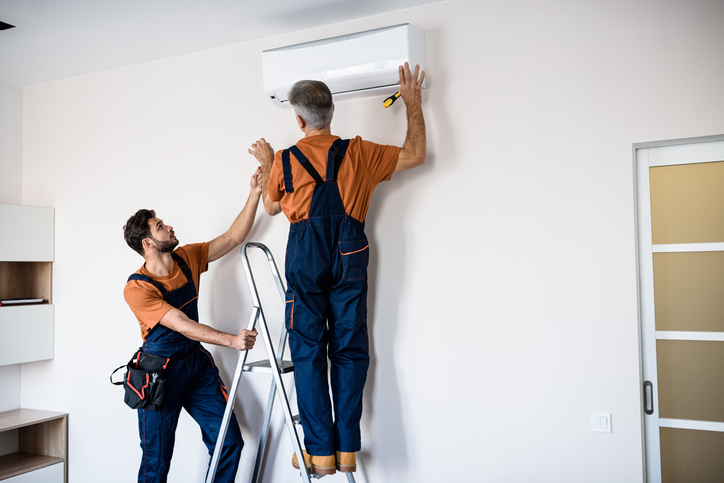Introduction
When it comes to keeping your home cool and comfortable during the warmer months, selecting the right air conditioning system is crucial. Two popular choices for homeowners are central air conditioning and ductless AC systems. Both have distinct advantages and considerations, making it important to evaluate your needs, budget, and home structure before making a decision. Central air conditioning systems are often favored for their ability to cool large homes efficiently, while ductless systems offer flexibility and ease of installation in homes without existing ductwork. In this article, we will delve into the key factors that influence the decision between central air and ductless AC installation, helping you make the best choice for your home.
Central vs. Ductless AC: Which Installation Suits You?
1. Installation Complexity and Cost:
One of the most important factors to consider when choosing between central air and ductless AC is the installation complexity and cost. Central air systems typically require a more complex installation process, especially in homes that do not already have existing ductwork. This can involve running ducts throughout the house, which can be disruptive and costly, particularly if your home requires significant modifications. On the other hand, ductless systems are easier and faster to install, requiring only a small hole in the wall for the conduit connecting the indoor and outdoor units. While ductless systems typically have a higher initial cost per unit, the overall installation cost is often lower than that of central air, making them a more cost-effective option for homes without existing ductwork.
2. Energy Efficiency and Running Costs:
Energy efficiency plays a significant role in the long-term operational costs of your air conditioning system. Central air conditioners can be energy-efficient, but their efficiency can be compromised by issues such as leaky ducts, which can result in significant energy loss. Ductless AC systems, in contrast, are highly efficient since they avoid the energy losses associated with ductwork. With ductless systems, you can cool specific rooms or zones, allowing you to avoid cooling areas that are not in use. This zoning feature can result in substantial energy savings, as you only use the system where and when needed. While both systems can be energy-efficient with proper maintenance, ductless units typically offer a higher level of efficiency, especially in smaller or multi-zone homes.
3. Cooling Effectiveness and Coverage:
The effectiveness of an air conditioning system largely depends on the size and layout of your home. Central air systems are designed to cool larger spaces evenly, making them a great option for large homes or multi-story properties. They are equipped with powerful compressors and extensive ductwork that can circulate air throughout every room, ensuring consistent temperatures. However, if you live in a smaller home or need to cool specific rooms, central air may be overkill, resulting in unnecessary energy use. Ductless AC units, with their ability to cool individual rooms or zones, are ideal for homes where different areas have varying cooling needs. For smaller homes, apartment-style living, or homes without ducts, ductless systems offer more targeted and customizable cooling.
4. Maintenance Requirements:
When it comes to maintenance, both central air and ductless AC systems have their own specific needs, but the frequency and complexity of maintenance can vary. Central air systems require regular servicing of the ductwork and filtration system, which can be time-consuming and costly if your ducts are hard to access or require frequent cleaning. The outdoor condenser unit also needs periodic inspection, and refrigerant levels should be checked regularly. Ductless systems, on the other hand, require less maintenance, as they do not have ducts to clean or maintain. The filters in ductless units should be cleaned regularly, but the overall maintenance is less intensive compared to central air systems. For homeowners seeking to minimize maintenance headaches, a ductless AC system may be a more suitable choice.
5. Aesthetics and Space Considerations:
Another key difference between central air and ductless systems is their impact on your home’s aesthetics. Central air systems are largely hidden from view, with the exception of vents and registers, which can be easily integrated into your home’s design. Ductless AC systems, however, require visible indoor units, which are typically mounted on walls or ceilings. While these units are relatively compact and can be placed discreetly in most rooms, they may not blend as seamlessly into your home’s décor as central air. If you have a home with minimal wall space or a specific design aesthetic, you may find the visible units of ductless systems less appealing. However, for homes where maintaining a clean and modern look is important, there are sleek models available that can be integrated more subtly into the room.
6. Noise Levels:
Noise can be a concern with both central air and ductless AC systems, but the source of the noise differs. Central air systems tend to be quieter in the living spaces because the noisy components, such as the compressor and fan, are located outside the home. However, some noise can still be heard when the system is running, especially near the vents. Ductless AC systems are generally quieter because their indoor units operate with minimal sound. The outdoor compressor unit may still generate noise, but the indoor units tend to be very quiet, making ductless systems a good option for bedrooms or other quiet spaces where noise can be disruptive. For homeowners who prioritize noise reduction, ductless systems offer a more peaceful environment.
7. Long-Term Value and Return on Investment:
When considering long-term value, both central air and ductless systems offer significant benefits, but they cater to different needs. Central air systems are often a good investment for larger homes or homes with existing ductwork. They provide consistent, whole-home cooling and can increase the overall value of your home. However, if your home is smaller, lacks ductwork, or you only need to cool specific rooms, a ductless AC system may be a more cost-effective solution that provides greater value in the long run. Additionally, the energy savings and lower maintenance costs of ductless systems can provide a solid return on investment over time. Ductless systems also offer flexibility for future home improvements, as you can add additional units or zones as needed.
8. Environmental Impact and Sustainability:
For environmentally conscious homeowners, both central air and ductless AC systems can be energy-efficient if chosen carefully. However, ductless systems tend to have a smaller carbon footprint due to their higher energy efficiency and zoning capabilities. By cooling specific areas of the home instead of the entire house, ductless systems can help reduce overall energy consumption, resulting in lower greenhouse gas emissions. Many modern ductless systems are also equipped with inverter technology, which adjusts the compressor speed to match cooling needs, further improving efficiency. Central air systems, while also efficient, may use more energy if the entire home is being cooled, particularly if unused spaces are included in the cooling cycle.
Choosing between central air and ductless AC installation ultimately depends on the size, layout, and specific cooling needs of your home. Central air conditioning is ideal for larger homes with ductwork, providing even and efficient cooling throughout the space. Ductless systems, on the other hand, offer flexibility, energy efficiency, and easier installation, especially for smaller homes or homes without ducts. Both systems have their advantages, and the right choice for you will depend on factors like installation costs, maintenance requirements, and energy savings. Regardless of your choice, both central air and ductless AC systems can provide lasting comfort in your home when properly selected and maintained.
Conclusion
Are you not sure which AC system is right for your home? Contact us at Chill Factor Cooling & Heating at 951-268-6520 to schedule a consultation and receive expert advice on selecting the ideal air conditioning solution for your specific needs.
📌 Count on Chill Factor Cooling & Heating for fast, friendly, and local service — expert HVAC and air quality solutions when you need them most!




